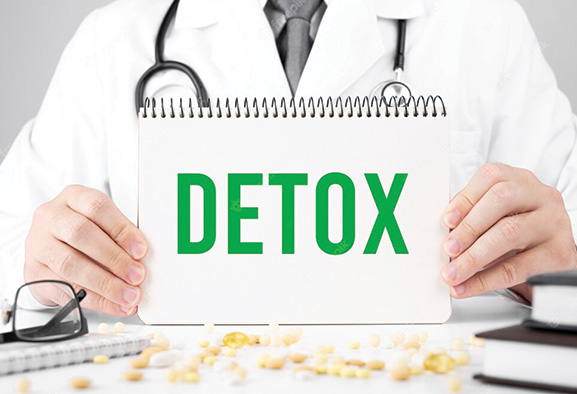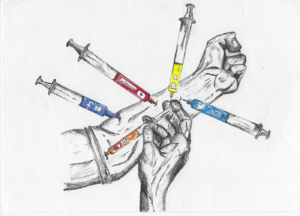In this fast-paced and modern world, our bodies are constantly exposed to various pollutants, chemicals, and toxins. These harmful substances can accumulate over time and have a detrimental impact on our health. This is where the importance of detoxification, or simply detox, comes into play.
The term “detox” is now widely used in both formal and informal contexts. But knowing what it means, and why it is necessary can make all the difference in the world. Let’s find out in this blog.
What is Detox?
Detox, short for detoxification, is a natural and vital process that allows the body to eliminate harmful substances and toxins that can accumulate over time. It involves various organs, primarily the liver, kidneys, skin, and lungs, working together to filter and excrete waste products and harmful compounds.
Toxins can enter our bodies through various sources, including the air we breathe, the food we eat, and the products we use. These toxins can be coming from external sources like pollution, processed foods, alcohol, and tobacco.
Proper detoxification is essential for maintaining overall health and well-being. When toxins accumulate in the body, they can lead to various health issues, including fatigue, skin problems, digestive disturbances, and weakened immune function.
By supporting and enhancing the body’s natural detoxification process, individuals can experience increased energy levels, improved digestion, clearer skin, and a strengthened immune system.

Why Detox is necessary?
Detox is necessary for several compelling reasons, as it plays a vital role in maintaining our overall health and well-being. Without proper detoxification, these harmful substances can accumulate and wreak havoc on our health.
Let’s explore why detox is necessary:
Elimination of Harmful Toxins:
Detoxification is the body’s natural mechanism to eliminate harmful toxins and waste products that we encounter daily. These toxins can come from the air we breathe, the water we drink, the food we eat, and even the personal care products we use. By detoxifying, we prevent these toxins from building up and causing damage to our cells and organs.
Improved Organ Function:
Toxins can put a strain on our vital organs, especially the liver and kidneys. Detoxification helps these organs function optimally by reducing the burden of processing and eliminating toxins. This, in turn, enhances our body’s overall efficiency and promotes better organ health.
Enhanced Energy Levels:
When our bodies are overloaded with toxins, we may experience chronic fatigue and low energy levels. Detoxification allows the body to work more efficiently, leading to increased energy and a renewed sense of vitality.
Stronger Immune System:
A healthy immune system is crucial for defending the body against infections and illnesses. Detox helps reduce the load on the immune system by eliminating toxins, allowing it to focus on fighting off pathogens and keeping us healthy.
Improved Digestion and Gut Health:
Toxins and unhealthy dietary choices can disrupt the balance of beneficial bacteria in our gut, leading to digestive issues and discomfort. Detoxification supports gut health restoration, promoting better digestion and nutrient absorption.
Weight Management:
Toxins, especially those stored in fat cells, can interfere with our body’s ability to regulate weight. Detoxification can help release these toxins and support weight loss efforts.
Clearer Skin:
Detoxification can lead to clearer and healthier-looking skin. By eliminating toxins, the skin’s natural radiance is restored, and common skin issues like acne and eczema may improve.
Mental Clarity and Focus:
Toxic overload can affect brain function, leading to brain fog and difficulty concentrating. Detoxification can enhance mental clarity, focus, and cognitive performance.
Hormonal Balance:
Toxins can disrupt hormone production and balance in the body, leading to hormonal imbalances. Detoxification helps regulate hormones, benefiting both men and women.
Long-Term Health Maintenance:
Regular detoxification is essential for long-term health maintenance and disease prevention. By reducing the toxic load, we lower the risk of chronic illnesses and promote longevity.
What do you mean by detox from drugs and alcohol?
Detoxification, or detox, is the process of clearing the body of drugs or alcohol that an individual has consumed. The purpose of detox is to safely manage withdrawal symptoms when someone stops taking drugs or alcohol.
Everyone has a different experience with detox, the type of drugs and duration of addiction affect the detox procedure.
Detox can be done at home or in a medical setting. Home detox is generally only recommended for people who are not experiencing severe withdrawal symptoms. Medical detox is a more supervised setting where people can receive medication and support to help them manage withdrawal symptoms.
The length of detox varies depending on the drug and the individual’s circumstances. Alcohol detox typically lasts 5-7 days, while opiate detox can last up to 10 days. Methadone detox can last several weeks.
How does Detox / Detoxification work?
Detoxification is a complex and intricate process that involves multiple organs and biochemical pathways working together to eliminate harmful toxins from the body.
It operates through two primary phases, aptly known as Phase 1 and Phase 2, each playing a crucial role in neutralizing and excreting toxins effectively.
Phase 1 – Activation and Transformation:
In Phase 1 of detoxification, enzymes in the liver start the process of transforming toxins into intermediate compounds. This step activates the toxins, making them more chemically reactive.
The goal here is to convert these harmful substances into intermediate metabolites that can be further processed in Phase 2.
During this phase, the liver’s cytochrome P450 enzyme system plays a pivotal role. These enzymes are responsible for oxidizing toxins, which makes them more soluble and easier for the body to handle.
However, this transformation process can sometimes create highly reactive and potentially harmful substances known as free radicals.
Antioxidant Defense:
To counteract the potentially damaging effects of free radicals produced in Phase 1, the body relies on a robust antioxidant defense system. Antioxidants, such as vitamins C, E, and glutathione, neutralize free radicals, preventing them from causing cellular damage. A diet rich in antioxidant-rich foods, like fruits and vegetables, can support this crucial defense mechanism.
Phase 2 – Conjugation and Excretion:
In Phase 2, the transformed intermediates from Phase 1 are further processed and combined with other molecules to become water-soluble. This process is called conjugation. Conjugation makes these water-soluble metabolites easier for the body to excrete through urine or bile.
Several pathways facilitate the conjugation process, including glucuronidation, sulfation, methylation, acetylation, and glutathione conjugation. Each pathway has specific enzymes that attach different molecules to the transformed toxins, making them more suitable for elimination.
Organs Involved in Detoxification:
As the transformed toxins become water-soluble, they are ready for excretion from the body. Different organs play vital roles in this final step of detoxification:
- Liver: The liver is the primary organ responsible for detoxification. Once the toxins have undergone Phase 1 and Phase 2 processes, they are sent to the gallbladder or small intestine for elimination.
- Kidneys: Water-soluble toxins that are not excreted through the bile are filtered by the kidneys and excreted through urine.
- Colon: Some toxins are eliminated through the colon in the form of feces.
- Lungs: Volatile toxins can be eliminated through the lungs when we breathe.
- Skin: Sweat glands in the skin can release toxins through perspiration.
How would you know if you require to Detox yourself?
Knowing if you need to detoxify involves recognizing certain signs and symptoms that may indicate a buildup of toxins in your body. While our bodies have a natural detoxification system, certain lifestyle factors and exposure to toxins can overwhelm this process.
If you experience any of the following signs, it might be an indication that your body could benefit from a detox:
Persistent Fatigue:
Feeling constantly fatigued, despite getting enough sleep, could be a sign that your body is dealing with an excessive toxic load. Toxins can impair energy production and affect the functioning of various organs, leading to fatigue.
Skin Issues:
Unexplained skin problems like acne, eczema, rashes, or dry and itchy skin might be related to an accumulation of toxins. When toxins build up, they can affect the health and appearance of your skin.
Digestive Problems:
Frequent bloating, gas, constipation, or diarrhoea could be indicative of digestive issues linked to toxins in the body. An overload of toxins may disrupt the balance of gut bacteria and lead to digestive discomfort.
Frequent Headaches:
Persistent headaches and migraines might be a sign of toxic overload. Toxins can trigger inflammation and nerve sensitivity, leading to headaches.
Brain Fog and Poor Concentration:
Difficulty focusing, mental confusion, and poor memory are common signs of brain fog, which could be connected to toxins affecting brain function.
Unexplained Weight Gain:
If you’ve been struggling to lose weight despite making efforts, toxins stored in fat cells may be interfering with your body’s ability to regulate weight.
Bad Breath and Body Odor:
Foul-smelling breath and body odor might indicate that your body is not efficiently eliminating toxins.
Food Cravings:
Intense cravings for sugary, processed, or unhealthy foods may be a signal that your body is trying to cope with toxins and imbalances.
Hormonal Imbalances:
Toxic substances can disrupt hormone production and lead to irregular menstrual cycles, mood swings, or other hormonal issues.
Sensitivity to Environmental Toxins:
If you are particularly sensitive to environmental toxins, such as strong odors or chemicals, it could be an indication that your body’s detoxification system needs support.
Conclusion
Detoxification is a natural and essential process that is crucial in maintaining overall health and well-being. By understanding the science behind detox, the sources of toxins, and the numerous benefits it offers, you can make informed decisions about incorporating detoxification practices into your lifestyle.
Remember to approach detoxification with a balanced and gentle approach, and always consult a healthcare professional before making significant changes to your diet or lifestyle.
At Drug Rehab Center, we offer a comprehensive and effective detoxification process that prioritizes your health and well-being. Our detox program is designed to support your body’s natural detoxification system while providing a safe and comfortable environment for the detox journey.
Throughout the detox process, you will receive 24/7 medical supervision from our dedicated team of healthcare professionals. Our highly trained staff will monitor your vital signs, manage any potential withdrawal symptoms, and provide the necessary support and care to ensure a smooth detox journey.
Frequently Asked Questions about Detox
Q: What are the common signs that indicate the need for detoxification?
A: Common signs include fatigue, bloating, skin issues, bad breath, and persistent headaches.
Q: Is detoxification suitable for everyone?
A: While detoxification is generally safe for most people, it’s essential to consult a healthcare professional, especially if you have pre-existing health conditions.
Q: How often should I detox?
A: The frequency of detoxification depends on your lifestyle, dietary habits, and overall health. A gentle detox once every few months is typically sufficient for most individuals.
Q: Can I exercise during detoxification?
A: Light to moderate exercise is generally encouraged during detoxification as it can support the elimination of toxins through sweating.
Q: Can I detox while pregnant or nursing?
A: Pregnant and nursing women should avoid rigorous detox programs, but minor dietary adjustments can be beneficial with the guidance of a healthcare provider.






